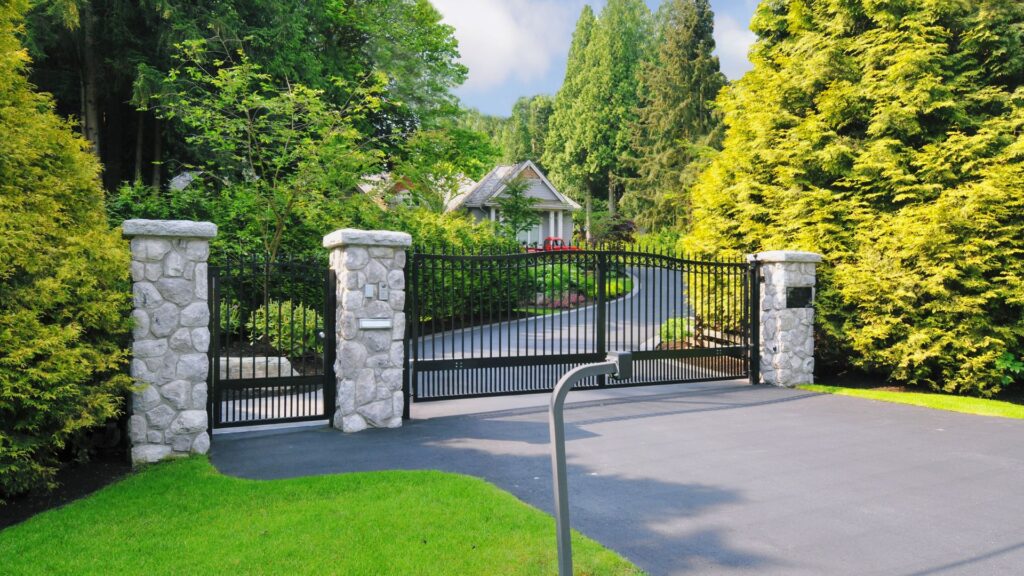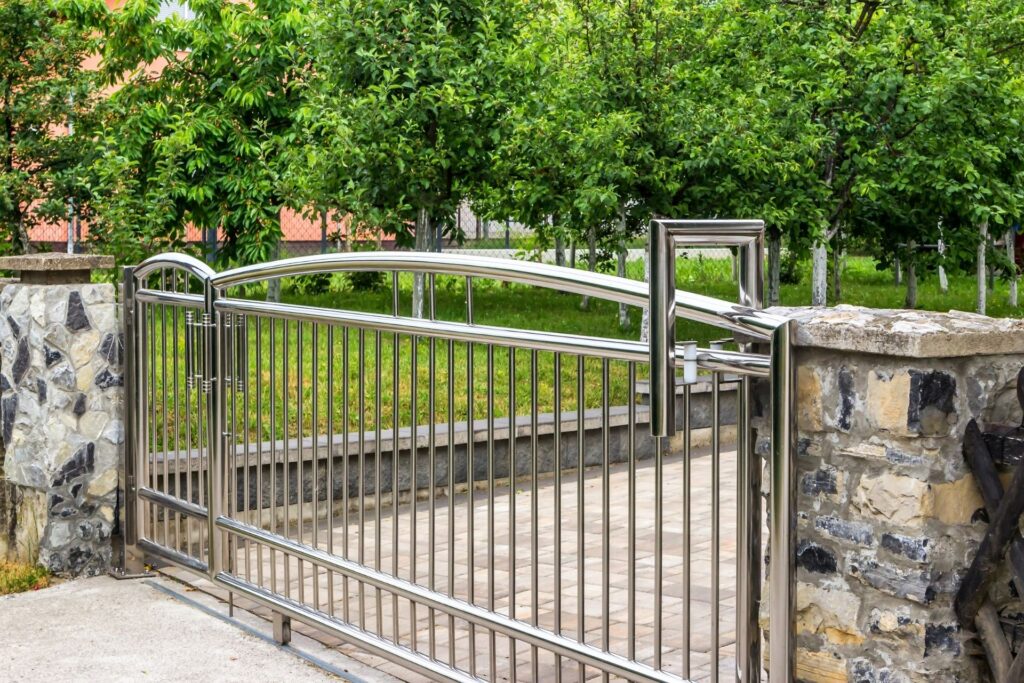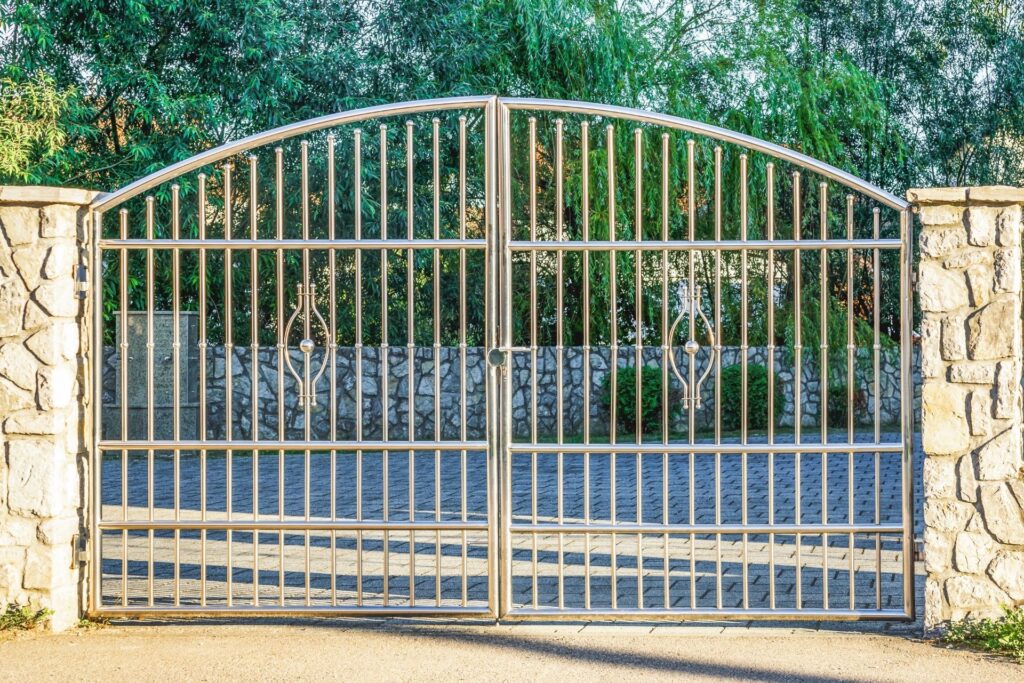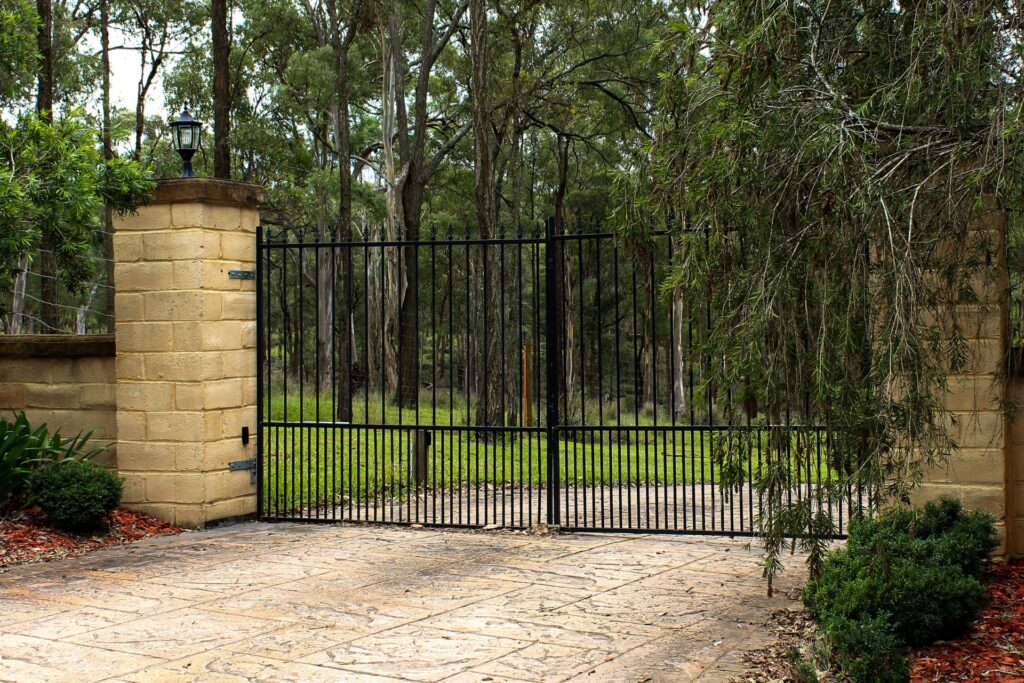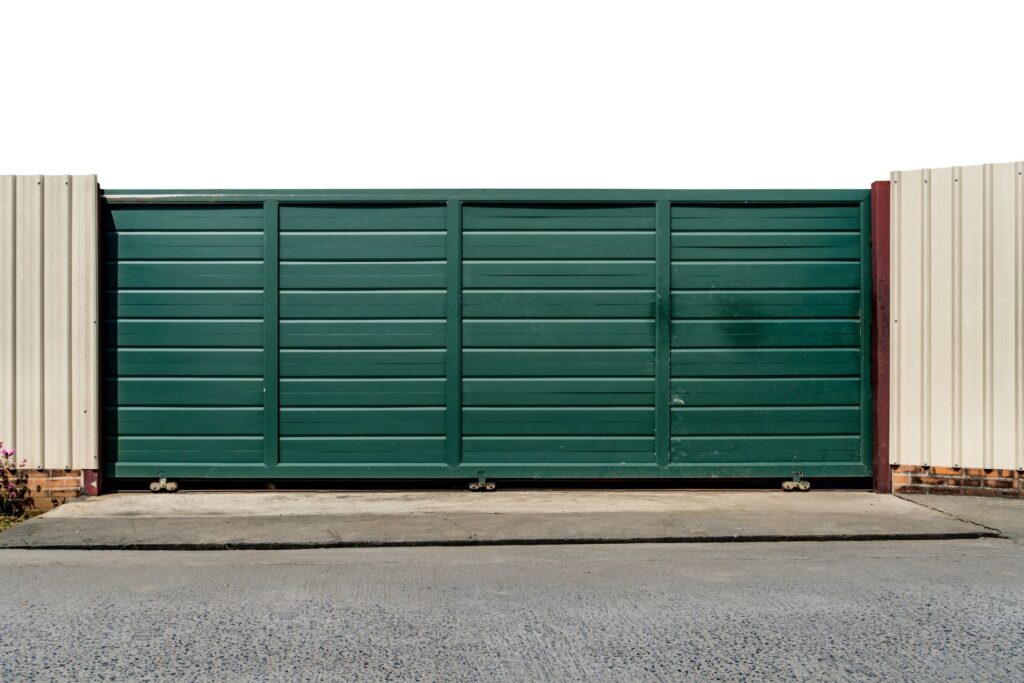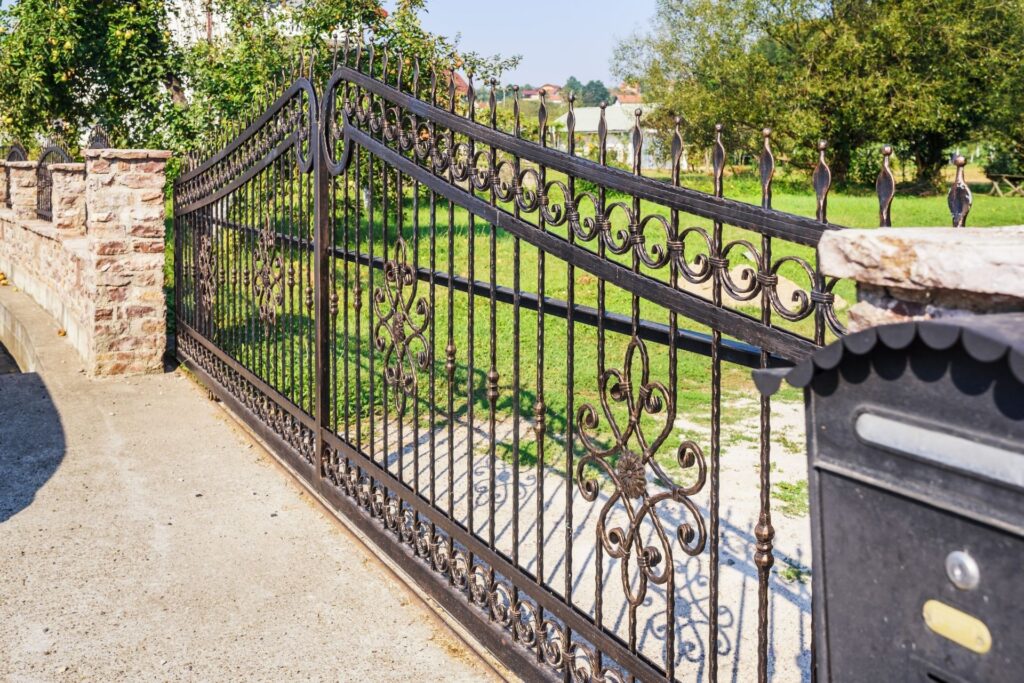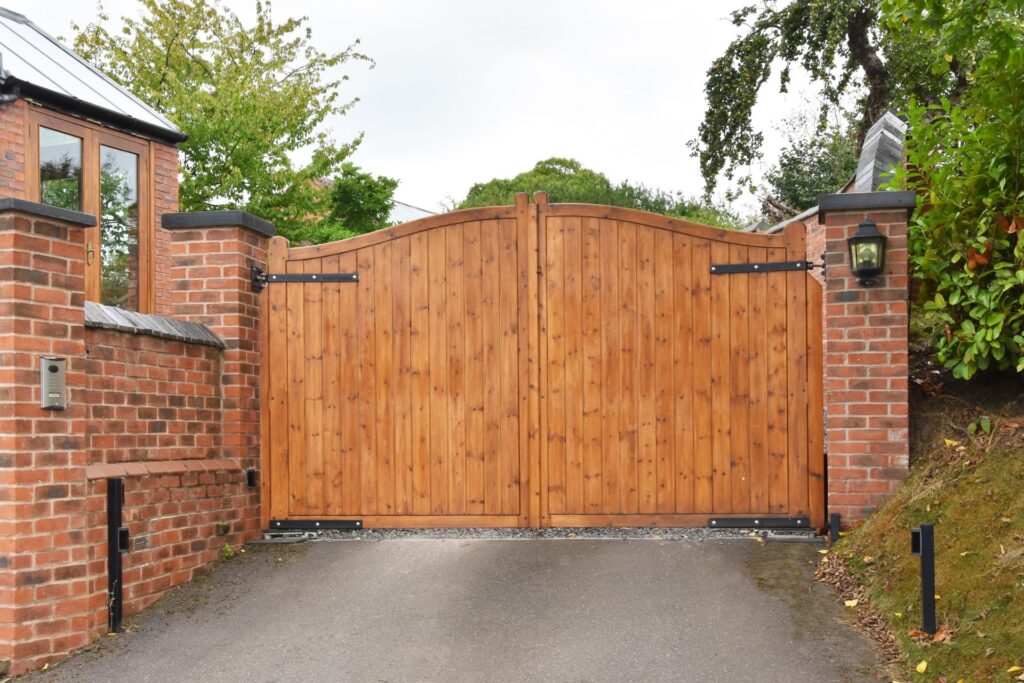Welcome to our comprehensive guide on the best gates for gardens in NZ! A garden gate is more than just an entry point—it’s the perfect blend of functionality and charm, adding character to your outdoor space while offering security and privacy. Whether you’re looking to complement a modern, minimalist garden or enhance a rustic, cottage-style setting, choosing the right gate is key to creating a welcoming and cohesive look. In this post, we’ll walk you through everything you need to know about selecting the ideal garden gate, from popular styles and materials suited to New Zealand’s unique climate to tips on maintenance and local retailers, ensuring your garden stands out while staying practical and durable.
The best gates for gardens in NZ combine style, durability, and functionality to enhance your outdoor space. Popular options include wooden gates for a rustic charm, metal gates for strength and elegance, and aluminium gates for low-maintenance durability. For NZ’s unique climate, weather-resistant materials like treated wood and powder-coated metal are ideal. Whether you prefer a traditional look or a modern design, choosing the right garden gate ensures both security and aesthetic appeal.
Table of Contents
What Makes A Great Garden Gate?
When it comes to enhancing your garden, choosing the right gate plays a pivotal role. A well-chosen garden gate is more than just a functional barrier—it’s an essential design element that complements your garden’s overall style while meeting practical needs. Let’s break down the key factors that make a garden gate truly great, particularly in the context of New Zealand’s diverse gardens and unique climate.
Aesthetic Appeal
Your garden gate is often the first thing visitors see, setting the tone for the space beyond. A thoughtfully designed gate can seamlessly blend with your garden’s aesthetic, whether you’re going for a rustic charm, contemporary elegance, or traditional appeal. For instance:
- Rustic Gardens: Wooden gates with natural finishes or distressed details are perfect for creating a cozy, countryside feel.
- Modern Gardens: Sleek aluminium or minimalist metal gates with clean lines are ideal for complementing contemporary landscapes.
- Cottage Gardens: Decorative wrought iron gates, often adorned with intricate designs, bring a timeless, romantic look to classic garden styles.
Beyond just looking good, your gate should serve as an extension of your garden’s personality, harmonizing with surrounding elements like fences, pathways, and plantings. Selecting the right style ensures that your garden gate doesn’t just serve as an entrance but also as a visual focal point.
Durability
New Zealand’s climate can be challenging, with its high humidity, coastal salt air, and strong UV exposure. Therefore, the durability of your garden gate is a critical factor to consider. The materials you choose should be weather-resistant to ensure the gate remains sturdy and visually appealing for years to come. Here’s how different materials perform:
- Hardwood (e.g., macrocarpa, cedar): Durable and naturally resistant to decay, hardwood is an excellent choice for gardens across NZ. However, it requires occasional sealing or staining to maintain its look.
- Powder-Coated Metals: Steel and aluminium gates with powder coating provide excellent protection against rust and corrosion, making them perfect for coastal areas.
- Composite Materials: Blending wood fibers and plastic, composites are both weatherproof and low-maintenance, ideal for NZ’s fluctuating weather.
Choosing durable materials not only ensures your gate withstands the elements but also minimizes long-term repair or replacement costs, making it a worthwhile investment.
Functionality
A great garden gate is more than just decorative—it also needs to fulfill essential functional requirements. When selecting a gate, consider the following aspects of functionality:
- Privacy: If your garden is a private retreat, a solid gate design, such as wood or composite, can block outside views and create a secluded atmosphere.
- Security: A sturdy gate with secure locks or latches is essential for keeping children, pets, or even unwanted visitors safe and contained. Metal gates are particularly popular for their strength.
- Accessibility: Your gate should be easy to open and close while accommodating practical needs like garden equipment or foot traffic. Double gates or wider openings may be necessary for larger gardens.
Balancing these factors ensures your garden gate not only enhances the beauty of your outdoor space but also adds to its practicality.
Low Maintenance
For many NZ homeowners, low maintenance is a priority when choosing a garden gate. With busy lifestyles and unpredictable weather, having a gate that doesn’t demand frequent upkeep is a huge advantage. Here are a few materials known for their low-maintenance qualities:
- Aluminium: Resistant to rust and corrosion, aluminium gates require only occasional cleaning to maintain their appearance.
- Vinyl (PVC): These gates are highly resistant to the elements and never need painting, although they may need cleaning from time to time.
- Treated Hardwood: While wooden gates are not completely maintenance-free, treated wood requires less frequent care compared to untreated options.
Low-maintenance gates not only save time but also ensure that your investment retains its charm and functionality with minimal effort.
A great garden gate strikes the perfect balance between aesthetic appeal, durability, functionality, and low maintenance. In New Zealand, where the climate demands robust materials and homeowners often seek beautiful, practical solutions, choosing the right garden gate is a decision worth careful consideration. By selecting a gate that aligns with your garden’s style and practical needs, you’ll create a welcoming entrance that enhances the overall charm and usability of your outdoor space.
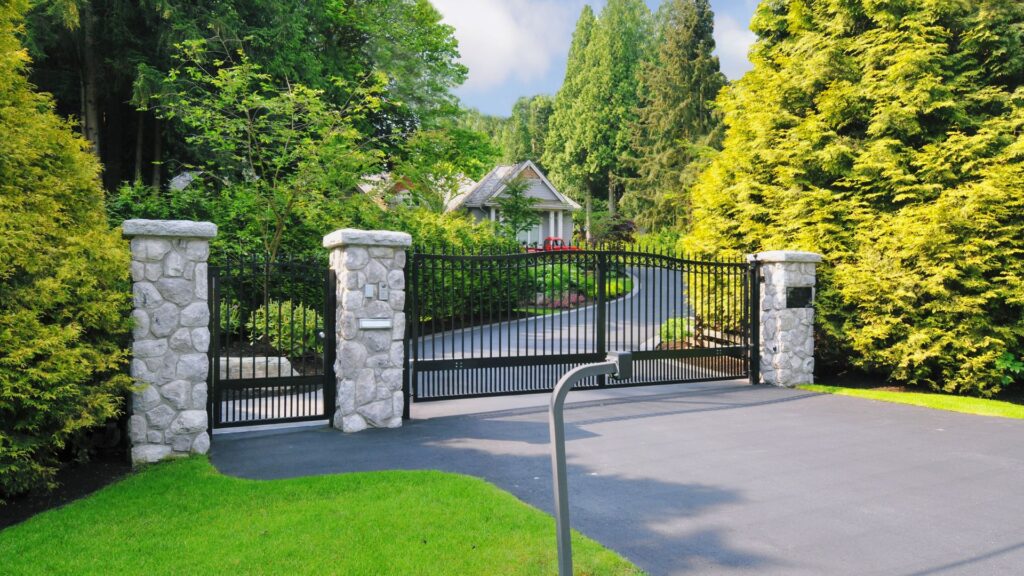
Popular Types Of Garden Gates In NZ
When it comes to enhancing your garden, the type of gate you choose can significantly impact both its aesthetic and functionality. In New Zealand, where gardens range from quaint cottage styles to sleek, modern designs, selecting the right garden gate is essential. Below, we explore the most popular types of garden gates in NZ, detailing their characteristics, advantages, and considerations to help you make an informed decision.
Wooden Gates
Wooden gates have long been a favorite for their natural charm and versatility, making them a timeless choice for New Zealand gardens. These gates are particularly well-suited for traditional or rustic landscapes, such as cottage-style gardens or rural properties.
- Description: Wooden gates exude a classic and earthy appeal, blending seamlessly with lush greenery and natural surroundings. They are available in various styles, from simple picket designs to more intricate panel work, offering endless customization possibilities.
- Pros:
- Natural Look: Wooden gates complement the organic feel of gardens, enhancing their aesthetic harmony.
- Versatile: Easily customizable with different finishes, stains, or paints to suit any garden theme.
- Customizable: Homeowners can adjust the size, shape, and design to fit unique garden layouts.
- Cons:
- Regular Maintenance Required: Wooden gates are prone to rotting, warping, and weathering if not properly maintained. Regular treatments with sealants or paints are essential to preserve their longevity.
- Weather Vulnerability: In NZ’s humid or coastal regions, wood can degrade faster without adequate protection.
Metal Gates
Metal gates, including wrought iron and steel options, are synonymous with strength and elegance. These gates are a popular choice for homeowners seeking durability combined with an ornate or modern aesthetic.
- Description: Metal gates often feature intricate designs that add sophistication to gardens. Whether it’s a simple steel gate for a sleek modern look or an elaborate wrought iron piece for a traditional garden, metal gates are highly versatile.
- Pros:
- Durable: Metal gates are built to withstand wear and tear, making them ideal for long-term use.
- Secure: Their robust structure enhances security, especially when paired with quality locks.
- Elegant Designs: Wrought iron gates, in particular, offer intricate patterns and decorative elements that elevate the garden’s appearance.
- Cons:
- Higher Cost: Metal gates, especially wrought iron, can be expensive to purchase and install.
- Susceptible to Rust: Without proper care, metal gates may rust, especially in coastal or humid environments. Regular maintenance like painting or powder-coating is necessary.
Aluminium Gates
Aluminium gates have gained popularity in New Zealand for their lightweight construction and modern appeal. They’re an excellent choice for those seeking a practical, contemporary option that requires minimal upkeep.
- Description: These gates are sleek and minimalist, often used in modern garden designs. Their lightweight nature makes them easy to install and operate while maintaining a clean, polished appearance.
- Pros:
- Rust-Resistant: Unlike steel, aluminium doesn’t corrode, making it ideal for NZ’s coastal areas.
- Low Maintenance: Requires only occasional cleaning to keep it looking new.
- Affordable: Generally less expensive than wrought iron or custom steel gates.
- Cons:
- Less Sturdy: Aluminium gates may lack the strength and durability of heavier materials like steel, which might not be ideal for high-security needs.
Vinyl or PVC Gates
For homeowners looking for a cost-effective and practical solution, vinyl or PVC gates offer a durable, weather-resistant option. These gates are especially suited for suburban gardens or areas where simplicity and affordability are key.
- Description: Vinyl gates are made from synthetic materials that mimic the look of wood or other finishes. They are available in various designs, from classic picket styles to contemporary solid panels.
- Pros:
- Weather-Resistant: Vinyl gates are impervious to moisture, UV rays, and pests, making them perfect for NZ’s changing weather conditions.
- Low Maintenance: Requires no painting or staining and only needs occasional washing to maintain its appearance.
- Design Variety: Available in different colors and patterns to match various garden styles.
- Cons:
- Environmental Concerns: Vinyl is less eco-friendly compared to natural materials like wood.
- Aesthetic Limitations: While practical, vinyl gates may not offer the same charm or authenticity as wooden or metal options.
Custom-Made Gates
For those who want a truly unique garden gate that perfectly reflects their style, custom-made gates are the ultimate solution. These gates are designed to fit specific garden layouts and preferences, ensuring a one-of-a-kind look.
- Description: Custom gates are tailored to your exact specifications, allowing you to choose everything from the material and size to intricate design details. They are ideal for homeowners who want a gate that stands out or complements an unusual garden layout.
- Pros:
- Unique Design: Offers complete creative freedom, ensuring your gate is truly one of a kind.
- Perfect Fit: Tailored to your garden’s dimensions and style, providing seamless integration.
- Material Flexibility: Choose from a wide range of materials, from wood and metal to composite and glass.
- Cons:
- Higher Cost: Custom gates can be expensive due to the bespoke design process and specialized craftsmanship.
- Longer Lead Time: Creating and installing a custom gate may take more time compared to off-the-shelf options.
New Zealand gardens are as diverse as the people who create them, and the type of gate you choose can make a significant difference in both style and function. Wooden gates offer timeless rustic appeal, while metal and aluminium gates provide strength and modern elegance. Vinyl gates are practical and low-maintenance, while custom-made gates offer the opportunity to create something truly unique. By considering your garden’s style, climate, and practical needs, you can select a garden gate that not only enhances your outdoor space but also stands the test of time.
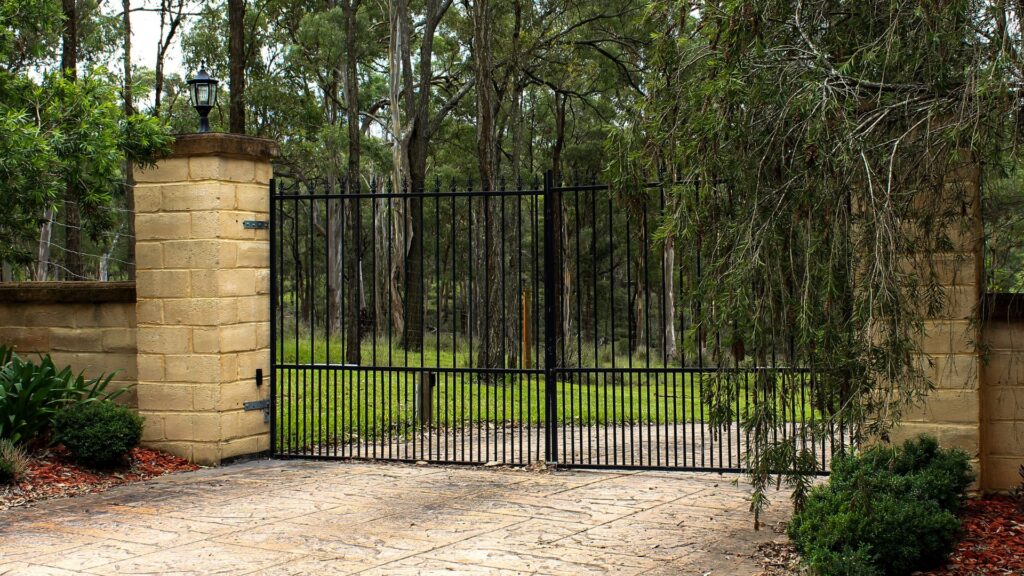
Materials To Consider For NZ’s Unique Climate
Choosing the right materials for your garden gate is critical, especially in New Zealand, where the climate can be challenging with its high humidity, salt-laden coastal air, and strong UV exposure. The materials you select should not only enhance your garden’s aesthetic but also withstand these environmental factors to ensure durability and longevity. Below, we explore the best materials for garden gates that are well-suited to NZ’s unique conditions, along with their benefits and considerations.
Hardwood: A Timeless, Durable Choice
Hardwood is a classic and reliable material for garden gates, offering both strength and natural beauty. In New Zealand, certain hardwoods are particularly well-suited to withstand the local climate, making them a top choice for durability and aesthetics.
- Best Options for NZ Conditions:
- Macrocarpa: A locally available timber that is naturally resistant to rot and decay, making it ideal for outdoor use in humid or rainy regions.
- Cedar: Lightweight yet strong, cedar is another excellent choice for NZ gardens, known for its natural oils that repel moisture and pests.
- Why Hardwood Works Well:
Hardwood gates bring a warm, organic feel to gardens and can be tailored to suit various styles, from rustic to contemporary. Their inherent durability ensures they can handle NZ’s varying weather conditions, but proper care is essential to maintain their longevity. - Maintenance Tips:
To prevent rotting and weathering, hardwood gates should be treated with sealants or stains periodically. This is particularly important in coastal areas where exposure to salt air can accelerate wear.
Powder-Coated Metals: A Modern, Resilient Option
Metal gates, when powder-coated, offer an excellent combination of strength, style, and durability. This finish provides a protective layer that is particularly beneficial in New Zealand’s coastal regions, where the air is often moist and salty.
- Why Powder Coating Matters:
Powder coating is a process that applies a durable, weather-resistant finish to metals like steel or aluminium. This coating prevents rust, corrosion, and fading, ensuring that your gate remains attractive and functional for years. - Advantages for NZ’s Climate:
- Resistant to Moisture: Powder-coated gates can withstand the high humidity and frequent rainfall experienced in many parts of NZ.
- Low Maintenance: Unlike untreated metals, powder-coated gates require minimal upkeep—occasional cleaning is enough to keep them looking fresh.
- Customizable Designs: Powder coating allows for a range of colors and finishes, so you can match your gate to your garden’s aesthetic.
- Ideal Locations:
These gates are particularly suited to coastal properties or areas with high rainfall, as they are less susceptible to rust and wear.
Weather-Treated Woods: Protection Against Rot and Warping
For those who prefer the natural look of wood but need added protection, weather-treated wood is an excellent choice. This material is specially processed to resist the common issues that arise from NZ’s varying weather patterns.
- How It’s Treated:
Weather-treated wood undergoes processes such as pressure treatment or chemical sealing to enhance its resistance to moisture, pests, and UV damage. This makes it far more durable than untreated wood. - Why It’s Ideal for NZ Gardens:
- Prevents Rot: Treated wood is less likely to absorb water, reducing the risk of rot even in rainy regions.
- Reduces Warping: The treatment process helps wood retain its shape and structural integrity despite exposure to moisture and temperature fluctuations.
- Sustainable Options: Some weather-treated woods are sourced from sustainable forestry, making them an eco-friendly choice.
- Perfect Applications:
Weather-treated woods are ideal for homeowners seeking the charm of a wooden gate without the intensive maintenance typically required.
Composite Materials: Durable and Sustainable
Composite materials are a modern solution for garden gates, offering a balance between durability and sustainability. These materials are created by combining wood fibers with plastic or other synthetic materials, resulting in a product that mimics the appearance of wood while offering superior resistance to weather and wear.
- Benefits for NZ Conditions:
- Weatherproof: Composite gates are highly resistant to moisture, rot, and fading, making them ideal for New Zealand’s rainy winters and sunny summers.
- Low Maintenance: Unlike natural wood, composite materials require no staining, sealing, or frequent cleaning—just a quick wash is enough to keep them in top shape.
- Eco-Friendly Option: Many composite materials are made from recycled plastics and wood fibers, making them a sustainable choice for environmentally conscious homeowners.
- Design Versatility:
Composite gates can be crafted to mimic the look of natural wood or take on sleek, modern designs. This flexibility makes them suitable for various garden styles, from rustic to contemporary. - Considerations:
While composite materials are durable and low-maintenance, they may not have the same warm, authentic feel as natural wood. However, for many homeowners, the trade-off is worth it for the durability and convenience.
New Zealand’s diverse climate calls for garden gate materials that can withstand everything from salty coastal air to heavy rain and intense sunlight. Hardwood gates, especially those made from macrocarpa or cedar, bring natural beauty and resilience. Powder-coated metal gates offer strength and rust resistance, perfect for modern gardens and coastal areas. Weather-treated woods provide the charm of timber with enhanced durability, while composite materials blend practicality with sustainability.
By carefully considering your garden’s specific needs and climate, you can select a material that not only elevates the aesthetic of your outdoor space but also ensures long-lasting performance. A well-chosen material means your garden gate will continue to serve as a functional and beautiful entrance for years to come.
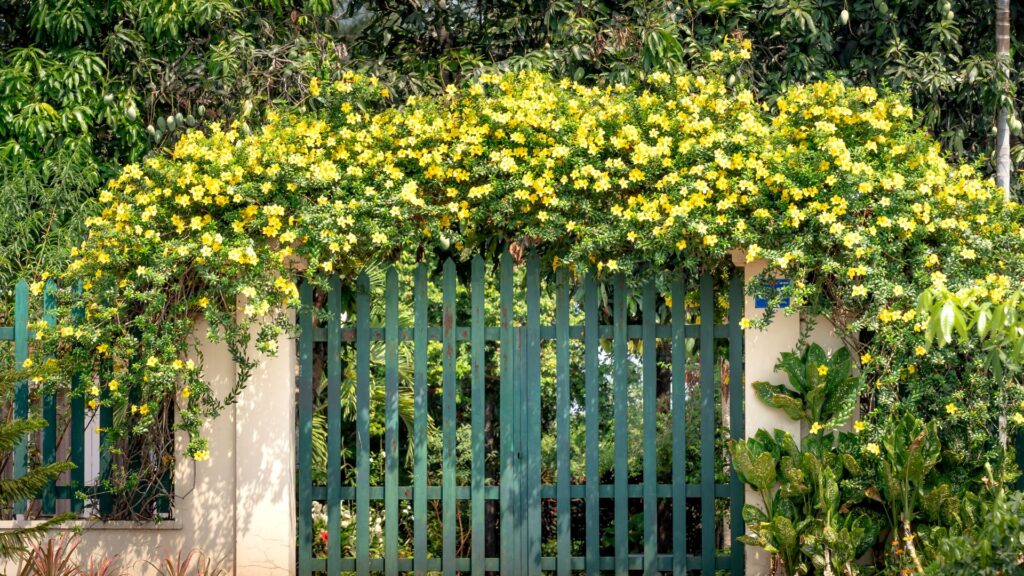
Factors To Consider When Choosing A Garden Gate
Selecting the right garden gate involves more than just picking a design that looks good. Your garden gate needs to meet your practical needs, enhance your outdoor space, and fit within your budget. With so many options available, it’s essential to evaluate key factors to ensure you’re making the best choice for your property. Below is a detailed guide to the critical considerations when choosing a garden gate, tailored to the needs of New Zealand homeowners.
Size: Standard Dimensions vs. Custom Sizing
The size of your garden gate plays a significant role in both its functionality and appearance. Before purchasing a gate, assess the layout and dimensions of your garden entrance to determine whether a standard or custom-sized gate will work best.
- Standard Dimensions:
Many off-the-shelf garden gates come in standard sizes, typically ranging between 900mm and 1200mm wide for single gates and up to 3600mm wide for double gates. These are cost-effective and suitable for most residential properties with straightforward layouts. - Custom Sizing:
For irregular garden layouts or larger entrances, custom-sized gates are often the best option. Custom gates ensure a perfect fit and can be designed to match the scale of your garden or pathway. For instance, a wider double gate might be necessary for vehicle access, while a narrow gate could suit a compact garden entrance. - Tip: Measure your space accurately, factoring in clearance for the gate to open and close smoothly. If in doubt, consult with a professional to ensure proper sizing.
Design Style: Modern, Traditional, or Eclectic
Your garden gate’s design style sets the tone for your outdoor space, making it an important consideration. The gate should harmonize with your garden’s aesthetic while reflecting your personal taste.
- Modern Minimalist:
Sleek and simple gates made from materials like aluminium or steel are perfect for contemporary gardens. Clean lines and neutral colors like black or grey work well with minimalist landscaping. - Traditional:
For a classic look, wooden or wrought iron gates are ideal. These designs often feature intricate patterns or natural finishes, making them suitable for cottage-style or heritage gardens. - Eclectic or Unique:
If you want your gate to stand out, consider custom designs that incorporate bold colors, mixed materials, or artistic patterns. These gates can serve as a statement piece, adding personality to your garden. - Tip: Choose a gate style that complements your fencing, pathways, and garden plants for a cohesive look.
Security Needs: Privacy, Locks, and Child/Pet-Friendly Features
A garden gate should not only be aesthetically pleasing but also functional and secure. Depending on your property and lifestyle, you may have specific security requirements.
- Privacy:
If your garden is a private retreat, opt for a gate with a solid design or built-in panels to block views from the outside. Materials like treated wood, composite, or vinyl are great for ensuring privacy. - Locks and Latches:
A secure locking system is essential for keeping your garden safe. Consider options such as keyed locks, combination locks, or heavy-duty latches. Smart locks with remote access are also becoming popular for added convenience. - Child and Pet Safety:
For families with children or pets, gates should be tall enough to prevent climbing or jumping over. Additionally, ensure the gate has child-proof locks and no gaps that small animals could squeeze through. - Tip: Balance security and accessibility. A secure gate should still be easy for authorized users to operate.
Budget: Price Ranges for Gates and Materials
Your budget will influence the type of garden gate you choose, as well as the material and design. Understanding the price ranges for different gate options can help you plan effectively.
- Affordable Options:
Gates made from vinyl, treated pine, or standard aluminium typically range between $150 and $500, making them a good choice for budget-conscious homeowners. - Mid-Range Gates:
Hardwood gates, powder-coated metal gates, and custom aluminium designs fall into this category, costing between $500 and $1,500 depending on size and complexity. - Premium Gates:
High-end materials like wrought iron or bespoke custom designs can exceed $2,000, especially for larger gates or intricate craftsmanship. - Tip: Factor in additional costs for hardware (locks, hinges) and installation when budgeting for your garden gate.
Installation Options: DIY vs. Professional Installation
Once you’ve selected the perfect gate, the next step is installation. Whether you choose to install the gate yourself or hire a professional depends on the complexity of the design and your experience with DIY projects.
- DIY Installation:
For simple gates like vinyl or lightweight aluminium designs, DIY installation can save money. Many gates come with installation kits and step-by-step instructions, making the process manageable for those with basic tools and skills. - Professional Installation:
For larger or more complex gates, such as custom metal designs or double gates, hiring a professional is recommended. Professional installers can ensure proper alignment, stability, and security, particularly if the gate includes automation or advanced locking systems. - Costs of Installation:
Professional installation costs typically range between $200 and $1,000, depending on the gate’s size and material. While this adds to the initial investment, it guarantees a long-lasting and secure fit. - Tip: If you’re unsure about installation requirements, consult with the gate manufacturer or retailer to determine the best option.
Choosing the right garden gate involves careful consideration of several factors, including size, design style, security features, budget, and installation options. Whether you’re prioritizing aesthetics, functionality, or durability, taking the time to evaluate these aspects will ensure your garden gate meets your needs and enhances your outdoor space. By selecting a gate that aligns with your garden’s layout and your lifestyle, you’ll create a welcoming, secure, and visually appealing entrance that adds value to your property.
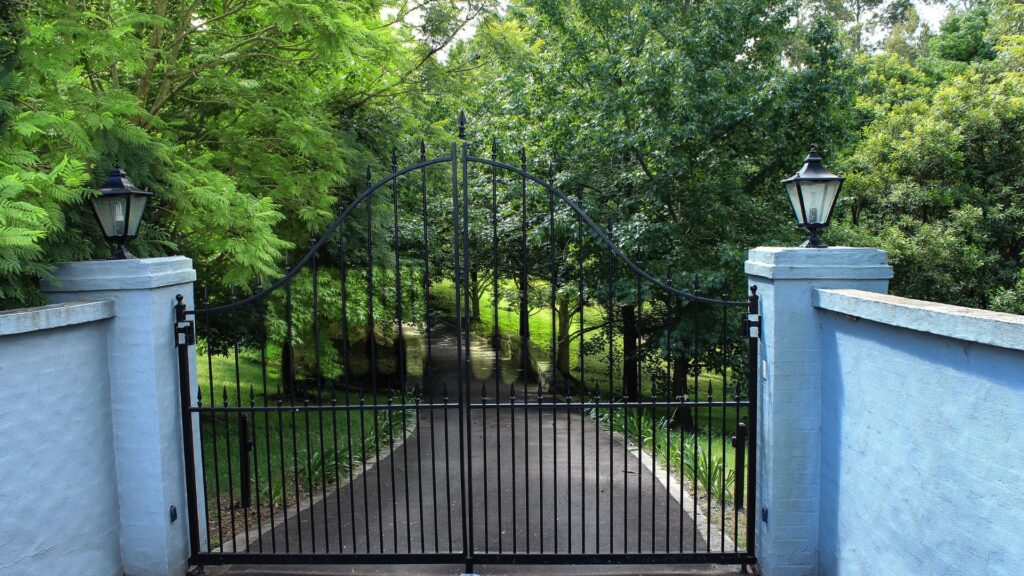
Top Garden Gate Brands And Retailers In NZ
Choosing the right garden gate is not only about selecting the perfect design or material—it’s also about finding a trusted retailer or manufacturer who can provide high-quality options that meet your specific needs. In New Zealand, there are several reputable brands and retailers offering a wide variety of garden gates, from affordable ready-made solutions to bespoke handcrafted designs. Here’s a detailed guide to the top garden gate suppliers in NZ, their specialties, and why they’re worth considering.
Fencing New Zealand: High-Quality Wooden Gates
If you’re looking for durable, beautifully crafted wooden gates, Fencing New Zealand is a go-to brand. They specialize in providing high-quality fencing and gates that cater to NZ’s unique climate and landscaping needs.
- What They Offer:
Fencing New Zealand is renowned for its selection of hardwood gates made from materials like macrocarpa and cedar. These gates are designed to provide a rustic, natural appeal while offering excellent durability in outdoor conditions. - Why Choose Them:
- Their gates are crafted to withstand New Zealand’s weather, with options that are pre-treated for rot and moisture resistance.
- They offer customizable sizes and designs to fit both residential and commercial gardens.
- The company emphasizes sustainability, using locally sourced timbers wherever possible.
- Best For:
Homeowners seeking premium wooden gates that complement traditional, rustic, or natural garden styles.
Stratco NZ: Steel and Aluminium Gate Solutions
For modern and robust garden gates, Stratco NZ is a leading name in the market. Known for its innovative designs and durable materials, Stratco offers gates that balance practicality and style.
- What They Offer:
Stratco specializes in steel and aluminium gates that are powder-coated for added weather resistance. Their products come in various designs, from sleek and minimalist to more decorative styles, making them versatile for different garden aesthetics. - Why Choose Them:
- Their gates are low-maintenance, making them ideal for busy homeowners or properties in coastal regions where rust can be a concern.
- Stratco offers a range of pre-designed gates as well as customization options.
- Their gates are known for their strength, making them a great choice for added security.
- Best For:
Homeowners looking for modern, durable gates that require minimal upkeep and provide excellent value for money.
Bunnings Warehouse: Affordable and Accessible Options
For budget-friendly garden gates that don’t compromise on quality, Bunnings Warehouse is a trusted retailer with branches across New Zealand. They offer a wide range of off-the-shelf gate options that cater to various needs and styles.
- What They Offer:
Bunnings stocks gates made from materials like treated pine, vinyl, and aluminium. Their gates are available in standard sizes and are designed for easy DIY installation. - Why Choose Them:
- Bunnings is known for affordability, making it an excellent option for homeowners on a budget.
- Their stores carry everything you need for installation, including hinges, locks, and other hardware.
- With a wide variety of styles, it’s easy to find a gate that matches your garden’s design.
- Best For:
Budget-conscious homeowners or DIY enthusiasts looking for accessible and cost-effective garden gate solutions.
Custom Gate Manufacturers: Bespoke Designs Tailored to Your Space
For those who want a one-of-a-kind garden gate that perfectly matches their vision, custom gate manufacturers are the ideal choice. These professionals specialize in creating bespoke gates tailored to your garden’s specific dimensions, style, and functional requirements.
- What They Offer:
Custom gate manufacturers work with a range of materials, including wood, metal, and composite, to craft unique designs. Whether you need a double gate for a wide entrance or intricate patterns to add character, they can bring your ideas to life. - Why Choose Them:
- Custom gates are designed to fit your exact specifications, ensuring a perfect match with your garden layout.
- You have full control over the material, finish, and features, allowing you to create a truly personalized gate.
- Many manufacturers offer professional installation services to ensure a seamless fit.
- Best For:
Homeowners who want a unique, high-quality gate that stands out and reflects their personal style.
Local Artisans: Unique, Handcrafted Garden Gates
Supporting local artisans is an excellent way to invest in a garden gate that is not only functional but also a work of art. Many New Zealand craftspeople specialize in creating handmade gates that showcase exceptional skill and creativity.
- What They Offer:
Local artisans often use materials like wrought iron, reclaimed wood, or even mixed media to craft one-of-a-kind gates. These gates often feature intricate details and a level of craftsmanship that mass-produced options can’t match. - Why Choose Them:
- Buying from local artisans supports the NZ crafts community and ensures you’re getting a product with a personal touch.
- Handcrafted gates are often made to order, allowing for a high degree of customization.
- Many artisans use sustainable practices, such as repurposing materials, making this a more eco-friendly option.
- Best For:
Homeowners looking for a truly unique, artistic gate that adds character and charm to their garden.
How to Choose the Right Supplier or Brand
When selecting a garden gate supplier, it’s important to consider your priorities:
- Budget: If affordability is your main concern, retailers like Bunnings Warehouse offer great value for money.
- Durability: For long-lasting gates that can withstand NZ’s climate, Stratco’s steel and aluminium options or Fencing New Zealand’s treated wood gates are excellent choices.
- Customization: If you need a gate tailored to your space, custom manufacturers or local artisans are your best bet.
- Style and Personality: Handcrafted gates from local artisans add a unique touch that’s perfect for gardens with distinct character.
New Zealand homeowners have a variety of excellent options when it comes to finding the perfect garden gate. From the high-quality wooden gates offered by Fencing New Zealand to the durable metal designs at Stratco, there’s a solution for every style and budget. For those looking to make a bold statement, custom gate manufacturers and local artisans provide unique, tailored designs that can transform your garden’s entrance into a standout feature. By choosing the right supplier, you can ensure your garden gate not only meets your functional needs but also enhances the overall charm and security of your outdoor space.
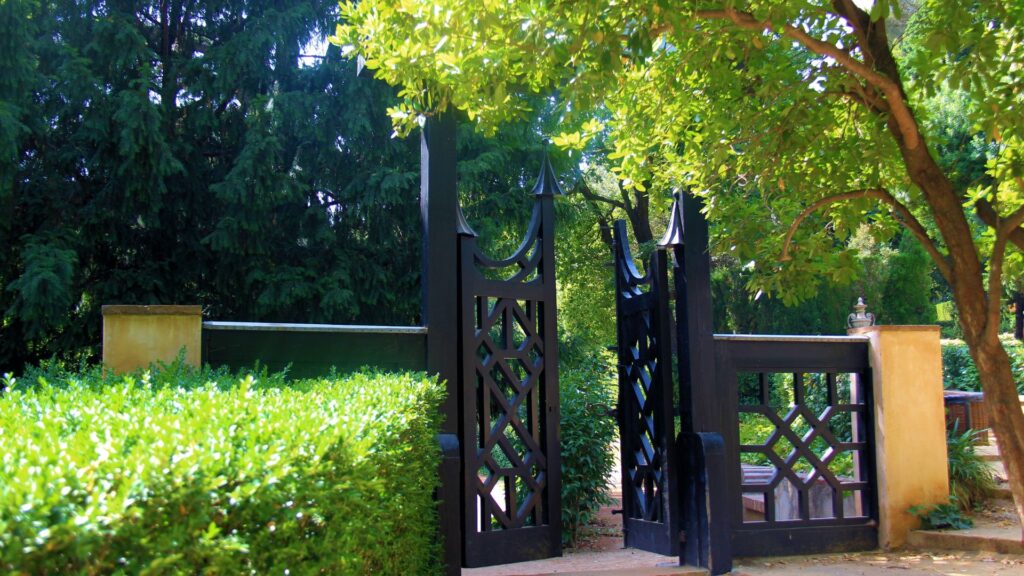
Styling Your Garden Gate
A garden gate is not just a functional feature—it’s an opportunity to elevate the aesthetic appeal of your outdoor space and create a warm, inviting entryway. By focusing on thoughtful styling, you can make your garden gate a true centerpiece that complements its surroundings while reflecting your personal taste. Below, we explore key elements to consider when styling your garden gate, from adding accessories to choosing the perfect finishes and integrating landscaping ideas for a cohesive look.
Gate Accessories: Adding Functional and Decorative Features
Accessories can transform a simple garden gate into a charming and personalized feature while adding convenience and functionality. Whether you’re prioritizing security, usability, or style, there are plenty of ways to accessorize your gate.
- Latches and Handles:
Functional yet decorative, latches and handles come in a wide range of styles and materials. For a rustic or traditional look, consider wrought iron or brass hardware. For modern gates, sleek stainless steel or matte black options work beautifully. Additionally, self-locking or child-safe latches are great for enhancing security. - Decorative Hinges:
Hinges don’t just have to be practical—they can also add visual interest. Look for ornate hinges for traditional gates or concealed hinges for a minimalist aesthetic. - Address Numbers and Name Plates:
Adding a house number or family nameplate to your gate can make it more personalized and practical. Opt for materials and styles that match the gate’s overall design, such as carved wood for a rustic gate or laser-etched metal for a contemporary one. - Finials and Post Caps:
These small details, such as decorative finials on metal gates or ornate post caps on wooden gates, can elevate the design and make your gate stand out. - Lighting:
Solar-powered lights mounted on the gateposts or along the surrounding pathway not only add style but also improve visibility and safety during the evening.
Paint and Finishes: Choosing Colors or Stains to Match Your Garden
The color and finish of your garden gate can significantly influence its overall aesthetic and how well it integrates with the rest of your garden. Choosing the right paint or stain is essential to ensure your gate complements your outdoor space while protecting it from weathering.
- Choosing the Right Color:
- For traditional gardens, opt for natural wood tones or muted colors like white, green, or earthy shades. These colors blend seamlessly with lush greenery and floral backdrops.
- For modern gardens, bold or neutral colors such as black, charcoal, or navy blue can create a sleek, minimalist look.
- For eclectic or artistic gardens, consider experimenting with vibrant colors like teal, red, or yellow to make your gate a playful focal point.
- Stains for Wooden Gates:
Staining wooden gates enhances their natural grain while protecting them from UV damage and moisture. Light stains give a fresh, modern feel, while darker stains create a rich, rustic vibe. - Powder Coating for Metal Gates:
If you have a metal gate, powder coating offers a durable, weather-resistant finish in a variety of colors and textures. This process protects the metal from rust and fading while giving it a polished appearance. - Weather-Resistant Finishes:
For gates exposed to NZ’s harsh weather conditions, invest in weatherproof paints or sealants. UV-resistant finishes help maintain vibrant colors, while waterproof coatings protect wood from rot and metal from rust. - Maintenance Tip: Regularly touch up paint or reapply stains to keep your gate looking fresh and prolong its lifespan.
Surrounding Landscaping: Enhancing Your Gate’s Setting
The beauty of a garden gate is amplified by the way it’s framed and integrated into its surroundings. Thoughtful landscaping around the gate can create a harmonious transition between your outdoor space and the gate itself, adding depth and visual appeal.
- Archways and Trellises:
Installing an archway or trellis above your garden gate adds vertical interest and a sense of grandeur. You can decorate these features with climbing plants like roses, jasmine, or clematis for a romantic, lush look. - Hedges and Shrubs:
Flanking your gate with hedges or shrubs creates a natural frame and enhances privacy. Boxwood, pittosporum, or lavender are excellent choices for a tidy and well-kept appearance. - Flower Beds:
Adding flower beds on either side of the gate softens the entrance and brings color and life to the area. Choose seasonal blooms or perennial plants that match your garden’s color palette. For example:- Bright, cheerful flowers like marigolds or geraniums for a cottage garden.
- Monochromatic schemes like white hydrangeas or silver foliage for modern designs.
- Pathways and Ground Cover:
A well-designed pathway leading to the gate enhances its charm and functionality. Use materials like gravel, pavers, or stepping stones for a polished look. Ground cover plants like thyme or creeping phlox can add softness to the edges of the path. - Lighting for Ambiance:
Incorporating soft lighting along the pathway or on the gateposts can create a welcoming ambiance. Solar-powered lights or lanterns are eco-friendly and easy to install.
Styling your garden gate is an opportunity to elevate your outdoor space and create a welcoming entrance that reflects your personality. From functional accessories like latches and handles to decorative touches like lighting and post caps, small details can make a big impact. Selecting the right paint or stain ensures your gate matches your garden’s aesthetic while protecting it from weather damage. Finally, integrating thoughtful landscaping, such as archways, hedges, or flower beds, creates a cohesive and visually appealing frame for your gate. With a little creativity and attention to detail, your garden gate can become a stunning focal point that enhances both the beauty and functionality of your outdoor space.

Maintenance Tips For Longevity
A well-maintained garden gate not only retains its charm but also ensures durability and functionality for years to come. Whether your gate is made of wood, metal, or composite materials, regular upkeep is essential to protect it from the elements and day-to-day wear and tear. Below is a detailed guide on how to maintain your garden gate, covering cleaning, weatherproofing, and repairs to keep it in excellent condition.
Regular Cleaning: Best Practices for Different Materials
Routine cleaning is one of the simplest yet most effective ways to extend the life of your garden gate. It prevents dirt, grime, and other buildup from deteriorating the materials and keeps your gate looking its best.
- Wooden Gates:
- Use a soft brush or cloth to remove dirt and debris from the surface.
- Wash the gate with a mild soap solution and rinse thoroughly with clean water. Avoid using harsh chemicals, as they can strip away protective finishes.
- Dry the gate completely to prevent moisture from seeping into the wood, which can cause warping or rotting.
- Metal Gates (Steel, Aluminium, Wrought Iron):
- Remove dust and dirt using a soft cloth or sponge with warm, soapy water.
- For tougher stains, use a non-abrasive cleaner that is safe for metal surfaces.
- Pay attention to corners and joints where dirt and moisture tend to accumulate.
- Rinse thoroughly to remove all soap residue and dry with a clean towel to prevent water spots or rust formation.
- Composite Gates:
- Wipe down the gate with a damp cloth or soft sponge.
- Use a mixture of water and mild detergent to clean stubborn stains.
- Composite materials are generally low-maintenance, but regular cleaning will prevent discoloration and mildew buildup.
- Pro Tip: Clean your gate at least once every three to six months, or more frequently if it’s exposed to heavy dirt, pollen, or coastal salt air.
Weatherproofing: Protecting Against Rust, UV Damage, and Moisture
Weatherproofing is crucial for garden gates in New Zealand, where fluctuating weather conditions—ranging from high humidity to intense sunlight—can take a toll on materials. Proper treatments can help protect your gate from rust, UV damage, and moisture, ensuring it lasts longer.
- Wooden Gates:
- Apply a weather-resistant sealant or wood preservative to protect against moisture and rot.
- Use UV-blocking stains or paints to prevent the wood from fading or cracking under the sun.
- Reapply protective coatings every one to two years, depending on the level of exposure to the elements.
- Metal Gates:
- For steel or wrought iron gates, apply a rust-inhibiting primer or finish to prevent corrosion.
- Powder-coated metal gates are already weatherproofed, but check for chips or scratches in the coating and touch them up promptly to avoid rust.
- Consider using a clear protective spray designed for metals to add an extra layer of defense against moisture and salt air.
- Composite Gates:
- Composite materials are inherently weather-resistant, but you can apply a UV-protective spray to prevent fading or discoloration over time.
- Pro Tip: Before applying any treatments, clean the gate thoroughly to ensure proper adhesion and effectiveness of the protective coatings.
Repairs: Quick Fixes for Common Issues
Over time, your garden gate may develop minor issues such as loose hinges, cracks, or surface damage. Addressing these problems promptly can prevent them from escalating into more significant repairs or replacements.
- Loose Hinges:
- Check hinges regularly to ensure they are secure. Tighten any loose screws with a screwdriver.
- If the screws no longer hold firmly due to wear, replace them with longer screws or use wood filler to reinforce the area before re-screwing.
- Minor Cracks in Wooden Gates:
- Fill small cracks with wood filler or epoxy, then sand the area smooth once it has dried.
- Apply a matching stain or paint to blend the repair with the rest of the gate.
- Rust on Metal Gates:
- Use a wire brush or sandpaper to remove rust spots from steel or wrought iron gates.
- After removing the rust, apply a rust-inhibiting primer and repaint the area to protect it from further corrosion.
- Scratches on Composite Gates:
- Minor scratches can often be buffed out with a fine-grit sandpaper or a composite repair kit.
- For deeper gouges, contact the manufacturer for recommended repair solutions.
- Sagging Gates:
- If your gate starts to sag, inspect the hinges and posts for damage or misalignment. Reinforce or replace the hardware as needed. In some cases, installing a diagonal support brace can restore the gate’s alignment.
- Pro Tip: Inspect your gate for damage at least once a season, or after extreme weather events, to catch and fix issues early.
Maintaining your garden gate is an ongoing process, but with regular cleaning, weatherproofing, and timely repairs, you can keep it looking great and functioning well for years to come. Whether your gate is made of wood, metal, or composite materials, adopting these maintenance practices will help protect your investment and enhance the overall appeal of your outdoor space. By taking the time to care for your garden gate, you’re not just preserving its longevity—you’re also ensuring that it continues to be a welcoming and beautiful feature of your property.
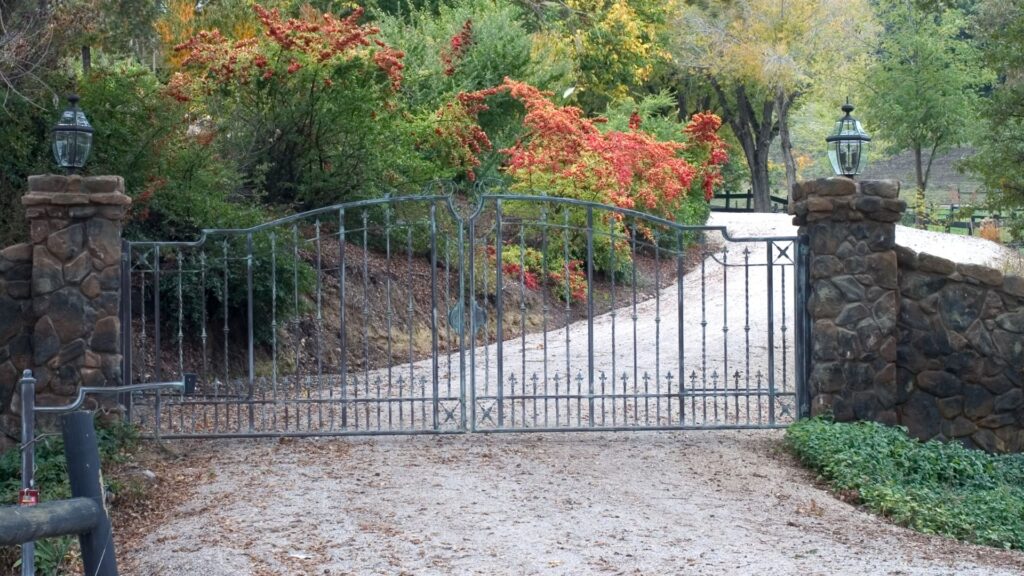
Sustainability And Eco-Friendly Choices
As environmental awareness grows, many homeowners are looking for ways to make eco-friendly choices, even when it comes to their garden gates. Sustainability doesn’t mean sacrificing style or quality—it’s about selecting materials and practices that minimize environmental impact while creating a gate that stands the test of time. In New Zealand, where natural beauty is deeply cherished, choosing sustainable options for your garden gate is not only responsible but also rewarding. Let’s explore the key ways to make eco-friendly choices when selecting and installing your garden gate.
Reclaimed Materials: Using Recycled Wood or Metal for Your Gate
One of the most effective ways to reduce your environmental footprint is by opting for reclaimed materials. Reusing wood or metal not only saves resources but also adds character and uniqueness to your garden gate.
- Reclaimed Wood:
- Sourced from old buildings, barns, or furniture, reclaimed wood is an excellent choice for garden gates. It brings a rustic, weathered charm that blends beautifully with natural surroundings.
- Using reclaimed wood reduces the demand for new timber, helping to preserve forests and minimize deforestation.
- Popular choices in NZ include macrocarpa or totara, which are durable and weather-resistant, even when repurposed.
- Recycled Metal:
- Gates made from recycled steel or wrought iron offer a sturdy and stylish solution while cutting down on energy-intensive mining and metal production processes.
- Recycled metal can be crafted into intricate designs, giving your gate a unique aesthetic while supporting eco-conscious practices.
- Benefits:
- Lower carbon footprint compared to manufacturing new materials.
- Creates a distinctive, personalized look that stands out from mass-produced gates.
- Reclaimed materials often have a story or history, adding sentimental value to your garden.
- Pro Tip: When choosing reclaimed materials, work with skilled artisans or manufacturers who specialize in upcycling to ensure the materials are properly treated and prepared for outdoor use.
Local Sourcing: Choosing NZ-Made Gates to Minimize Environmental Impact
Supporting local businesses and sourcing materials from within New Zealand is another way to make an eco-friendly choice. By opting for NZ-made gates, you reduce the carbon emissions associated with long-distance shipping while contributing to the local economy.
- Why Local Sourcing Matters:
- Gates made in New Zealand are often crafted from materials that are naturally suited to the local climate, such as macrocarpa or pine. This ensures durability and reduces the need for excessive treatments.
- Local manufacturers and artisans typically follow more stringent environmental regulations, ensuring sustainable practices in production.
- Purchasing locally eliminates the need for importing, reducing transportation-related emissions and packaging waste.
- Supporting Local Artisans:
- Many NZ-based craftspeople create bespoke gates using sustainable methods, such as using recycled materials or minimizing waste during production.
- Buying from local artisans helps preserve traditional craftsmanship and promotes the use of sustainable materials.
- Pro Tip: Look for suppliers or manufacturers with certifications that demonstrate a commitment to sustainability, such as Forest Stewardship Council (FSC) certification for wood or EcoWarranty for environmentally friendly practices.
Longevity Over Trends: Investing in Durable Gates That Last
Sustainability isn’t just about the materials used—it’s also about creating products that are built to last. Investing in a high-quality, durable garden gate reduces the need for frequent replacements, which can generate waste and consume additional resources.
- Why Durability Matters:
- A durable gate that withstands New Zealand’s variable weather conditions (including high humidity, UV exposure, and coastal salt air) will last for years without needing constant repairs or replacements.
- Long-lasting gates ultimately reduce resource consumption and the environmental impact of manufacturing and installation.
- Material Choices for Longevity:
- Hardwoods: Timbers like macrocarpa or cedar are naturally resilient and require less frequent maintenance, making them an eco-friendly option.
- Powder-Coated Metals: Powder coating enhances the durability of steel or aluminium gates by protecting them from rust and corrosion.
- Composite Materials: Blending recycled wood fibers and plastic, composites are weather-resistant and built to last while utilizing recycled content.
- Timeless Designs Over Fads:
- Choose a gate design that is classic and versatile, ensuring it remains relevant even as garden trends change. A timeless gate reduces the likelihood of it being replaced purely for aesthetic reasons.
- Pro Tip: Regular maintenance, such as cleaning and applying protective coatings, can significantly extend the lifespan of your gate, making it a more sustainable choice.
How Sustainability Benefits Your Garden and the Planet
Opting for sustainable and eco-friendly choices when selecting your garden gate is a win-win. Not only do these practices help preserve the environment, but they also allow you to create a gate that enhances the natural beauty of your outdoor space. By choosing reclaimed materials, supporting local suppliers, and prioritizing longevity, you’re contributing to a greener future while adding character and durability to your garden.
Sustainability doesn’t have to mean compromising on quality or style. With careful planning and thoughtful choices, your garden gate can be both environmentally friendly and a lasting feature that enhances the charm and functionality of your outdoor space. Make an eco-conscious decision today, and enjoy the benefits for years to come.
Looking for a stylish, durable, and functional garden gate to complete your outdoor space? Visit Fence and Gate Auckland to explore our collection, find expert advice, and choose a gate that blends security, style, and sustainability.
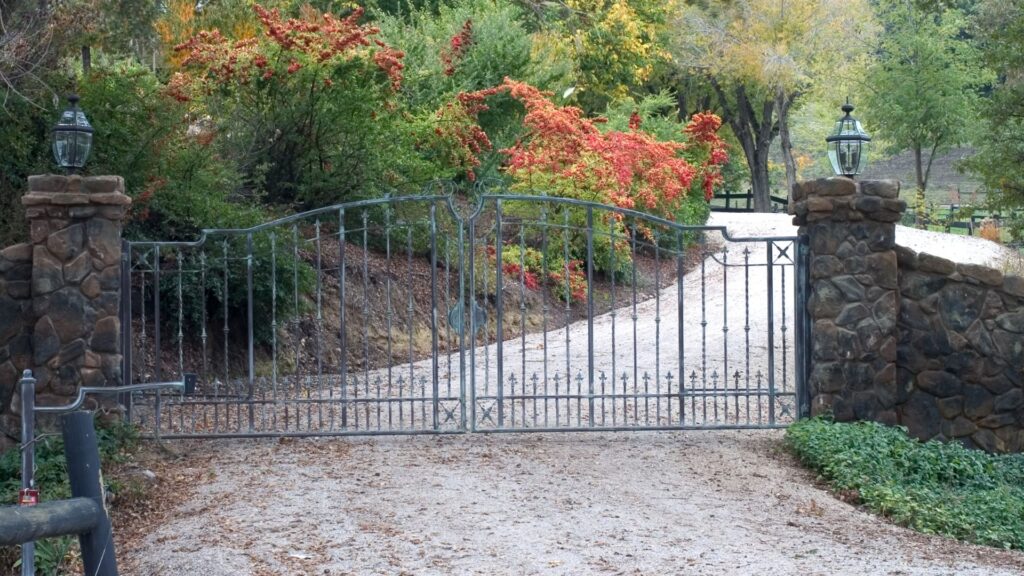
FAQs: About Best Gates For Gardens NZ
What are the most popular types of garden gates in NZ?
Popular garden gate types in New Zealand include wooden gates for their natural charm, metal gates for strength and elegance, aluminium gates for low maintenance, and vinyl gates for affordability. Custom-made gates are also a great option for unique designs.
What is the best material for a garden gate in NZ’s climate?
The best materials for NZ’s climate are treated hardwood for a natural look, powder-coated metal for corrosion resistance, and aluminium for lightweight durability. These materials are well-suited to handle New Zealand’s diverse weather conditions, including coastal air and high humidity.
How much does a garden gate cost in New Zealand?
Garden gate costs in NZ vary widely based on material and design. Basic wooden gates can cost between $150-$300, while custom metal or aluminium gates can range from $500 to over $2,000. Installation costs may also add to the overall price.
Are wooden gates a good choice for New Zealand gardens?
Wooden gates are an excellent choice for NZ gardens, especially when made from durable timbers like macrocarpa or cedar. However, they require regular maintenance, such as staining or sealing, to protect against moisture and rot.
What are the benefits of aluminium garden gates?
Aluminium garden gates are lightweight, resistant to rust, and low maintenance. They are a great option for modern gardens and coastal areas in NZ where exposure to salty air can be an issue for other materials like untreated steel.
Can I install a garden gate myself?
Yes, many garden gates come with DIY installation kits, especially simpler designs like wooden or vinyl gates. However, for larger or custom gates, professional installation is recommended to ensure proper alignment, stability, and security.
How do I maintain my garden gate to ensure longevity?
Regular cleaning, treating wooden gates with weatherproof coatings, and applying anti-rust treatments to metal gates are essential for longevity. Inspect hinges and locks periodically and make repairs as needed to prevent wear and tear.
What gate styles work best with NZ garden designs?
For rustic or cottage-style gardens, wooden gates with natural finishes are ideal. Modern gardens often pair well with sleek aluminium or metal gates. Custom gates allow you to match any unique style or aesthetic you’re aiming for.
What features should I consider when choosing a garden gate?
Key features to consider include size, material, design, security features (such as locks), and whether it is pet or child-friendly. Ensure the gate complements your garden’s overall style and provides the functionality you need.
Where can I buy garden gates in New Zealand?
Popular options for buying garden gates in NZ include Bunnings Warehouse for budget-friendly options, Stratco for metal and aluminium gates, and custom manufacturers for tailored designs. Supporting local artisans can also provide unique, high-quality gates.
Conclusion
Choosing the right garden gate is more than a functional decision—it’s an opportunity to enhance the beauty, security, and personality of your outdoor space. By carefully considering the top materials, such as durable hardwoods, weather-resistant metals, or low-maintenance composites, and selecting a style that complements your garden’s aesthetic—be it rustic, modern, or eclectic—you can create a gate that stands the test of time while making a lasting impression. A well-chosen gate not only reflects the character of your garden but also adds value and functionality to your property. Whether you opt for a custom design, a sustainable option, or a ready-made gate from a trusted NZ retailer, the key is to invest in a solution that meets your practical needs and personal preferences. We encourage you to explore local suppliers, consult with professionals for expert guidance, and share your own garden gate journey in the comments to inspire others. Your perfect garden gate awaits—start creating an entrance that’s as unique as your garden!
About the Author:
Mike Veail is a recognized digital marketing expert with over 6 years of experience in helping tradespeople and small businesses thrive online. A former quantity surveyor, Mike combines deep industry knowledge with hands-on expertise in SEO and Google Ads. His marketing strategies are tailored to the specific needs of the trades sector, helping businesses increase visibility and generate more leads through proven, ethical methods.
Mike has successfully partnered with numerous companies, establishing a track record of delivering measurable results. His work has been featured across various platforms that showcase his expertise in lead generation and online marketing for the trades sector.
Learn more about Mike's experience and services at https://theleadguy.online or follow him on social media:


